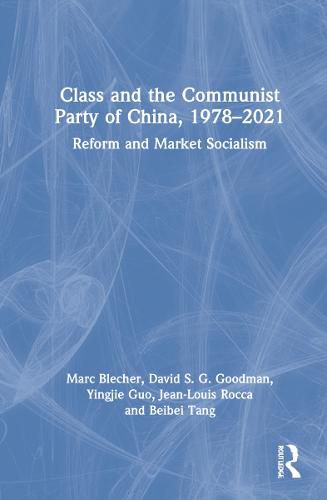Readings Newsletter
Become a Readings Member to make your shopping experience even easier.
Sign in or sign up for free!
You’re not far away from qualifying for FREE standard shipping within Australia
You’ve qualified for FREE standard shipping within Australia
The cart is loading…






By examining the changing political economy in China through detailed studies of the peasantry, workers, middle classes, and the dominant class, this volume reveals the Communist Party of China’s (CCP’s) impact on social change in China between 1978 and 2021.
This book explores in depth the CCP’s programme of reform and openness that had a dramatic impact on China’s socio-economic trajectory following the death of Mao Zedong and the end of the Cultural Revolution. It also goes on to chart the acceptance of Market Socialism, highlighting the resulting emergence of a larger middle class, while also appreciating the profound consequences this created for workers and peasants. Additionally, this volume examines the development of the dominant class which remains a defining feature of China’s political economy and the Party-state.
Providing an in-depth analysis of class as understood by the CCP in conjunction with sociological interpretations of socio-economic and socio-political change, this study will be of interest to students and scholars of Chinese Politics, Chinese History, Asian Politics, and Asian studies.
$9.00 standard shipping within Australia
FREE standard shipping within Australia for orders over $100.00
Express & International shipping calculated at checkout
By examining the changing political economy in China through detailed studies of the peasantry, workers, middle classes, and the dominant class, this volume reveals the Communist Party of China’s (CCP’s) impact on social change in China between 1978 and 2021.
This book explores in depth the CCP’s programme of reform and openness that had a dramatic impact on China’s socio-economic trajectory following the death of Mao Zedong and the end of the Cultural Revolution. It also goes on to chart the acceptance of Market Socialism, highlighting the resulting emergence of a larger middle class, while also appreciating the profound consequences this created for workers and peasants. Additionally, this volume examines the development of the dominant class which remains a defining feature of China’s political economy and the Party-state.
Providing an in-depth analysis of class as understood by the CCP in conjunction with sociological interpretations of socio-economic and socio-political change, this study will be of interest to students and scholars of Chinese Politics, Chinese History, Asian Politics, and Asian studies.